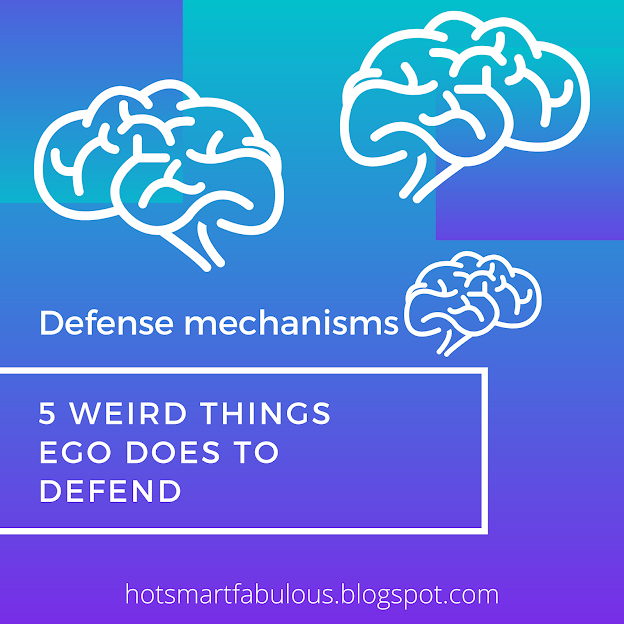Psychological defense mechanisms - 5 weird things ego does to defend and what to call them
Dear fabulous humans,
Have you heard of defense mechanisms? Any negative occurrence
that affects our mind hurts our ego and it is designed to defend itself during
such times. Just so you know, ego actually means our sense of self. In other words,
the actual “you” inside you. It’s meaning is usually misconceived. OK, so this
ego always tries to protect itself from any kind of negative emotion such as pain,
jealousy, disappointment, embarrassment etc. It is just like how you instinctively
close your eyes when dust or any object looms near your eyes. The ways in which
ego defends itself are defense mechanisms. There are around 20 different defense
mechanisms. Given, below are 5 major and common ones among them. Your take away
would be to know these terms and meanings so that you can identify and resolve
through introspection.Also, you can recognize them in others during relationship conflicts.
1.Displacement:
When you get a feeling toward one person or incident but direct
it towards another person or incident is called displacement. For example, you
might get angry on your boss and might not be able to show it to him or her.
You might go home and direct this anger towards your family for something trivial.
This is called displaced anger. Another example, Children might have been
beaten up by parents and they will direct it towards animals or insects.
2.Regression:
When a person changes his/her personality and behavior to
that of his/her younger self when he or she was happier it is called
regression. When one changes one’s behavior and personality to that of an
earlier and happier time period. For example, some middle-aged people who lack
the love and affection they need will suddenly start behaving like kids. The
ego regresses to the younger self because as children they might have been
cared for and protected by their parents
3.Repression:
Repression is the ego’s unconscious attempt to push down
your feelings and lock it without expressing it or venting. These repressed
wounds are of the worst kind because the emotional wound festers and damages
one from within. It might resurface in other inexpiable ways. For example, someone
might have lost a loved one to death and would have put on a brave face without
a single tear. His or ego would have pushed down the feeling of grief without
mourning.
4.Projection:
Like how a projector streams the video from itself on to the wall, if a person projects his or her own feelings on to someone else it is called projection. This is usually done by the ego to protect pride or to not look bad. Suppose Neha is jealous of Mina. Neha might keep saying or rather feeling consciously that Mina is jealous of Neha when the truth is the opposite. This is because Neha’s ego doesn’t want Neha to look bad. This is unconscious.
5.Reaction formation:
Behaving opposite to what our inner self feels. For example:
Rahul might have a crush on Neha but Rahul might behave the opposite way
showing extreme hatred and rudeness towards Neha. He might even declare how he can’t
stand the sight of her.This is the unconscious ego working to protect Rahul from exposing his vulnerability.
You must have realized
from these examples how common these situations are and how you’ve always known
these things but just not what to call them. Well, now that you’ve learnt it. You
could do some introspection and contemplate on them or could you use it as a
smart topic of conversation. I hope this blog taught you something interesting.
-Razina Zainudeen
Look good, be smart, feel fabulous!
Note to readers:
As you know i am just starting out on writing and if you find my blog interesting let me know in the comment section because it would mean a lot to me and help me improve too.



This is fabulous! Thoroughly enjoyed reading this. I am so happy that you are Psychology degree is in the spotlight now helping so many others to help themselves:)
ReplyDeleteThank you Swathi!I am glad it could help.
DeleteAwesome! Beautifully explained specially with all these examples! Looking forward to more ..
ReplyDeleteThank you so much Sri. I am glad u liked it:)
DeleteVery Informative and totally new. Great writing !
ReplyDeleteThanks Jennifer!glad u liked it!
Delete